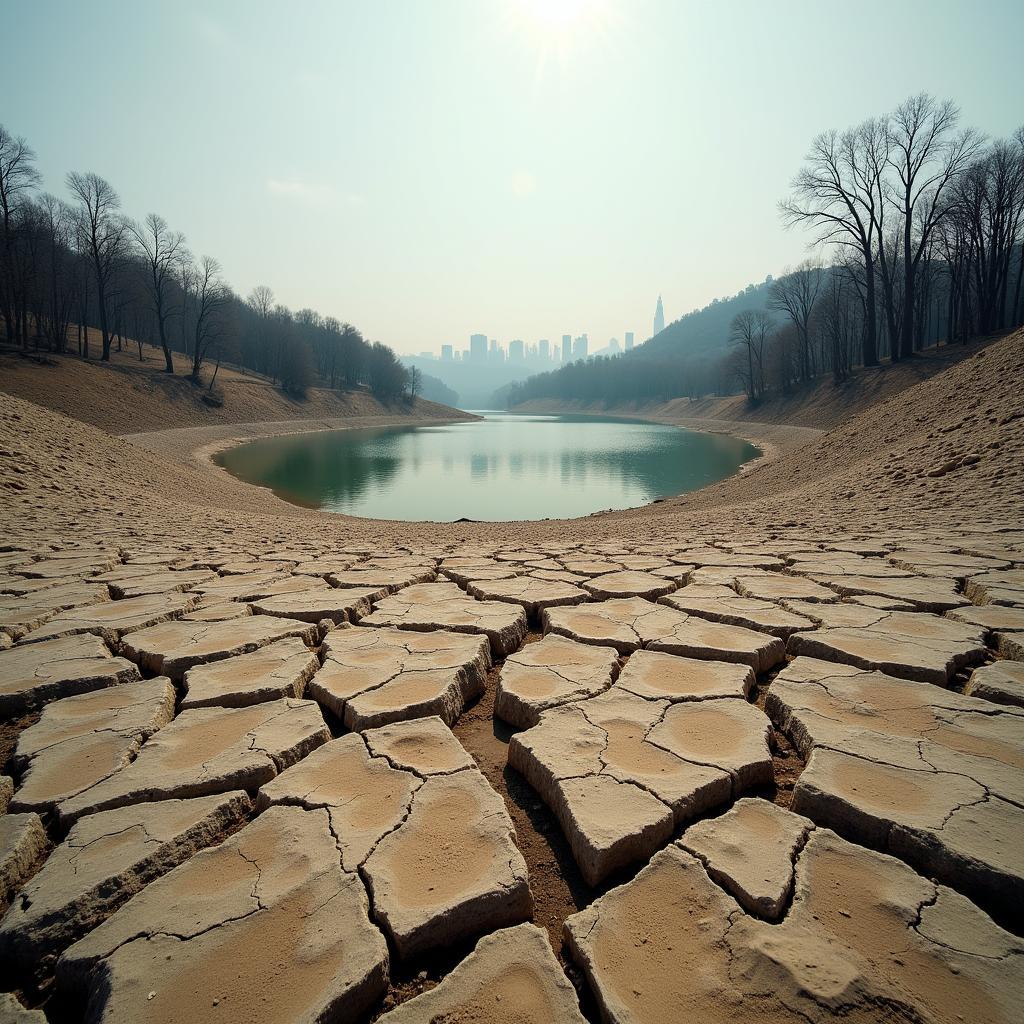Climate change and its effects on water resources has become an increasingly common topic in IELTS Writing Task 2 examinations. Based on analysis of past exam questions from 2018-2023, this theme appears in approximately 15% of environment-related tasks, making it a highly relevant subject for IELTS candidates to prepare for.
As how climate change affects global water resources becomes more critical, examining its impact on freshwater availability has emerged as a key focus in academic discussion and IELTS writing tasks.

Sample Question Analysis
Some experts believe that global climate change is the main factor affecting freshwater availability worldwide. To what extent do you agree or disagree with this statement? Give reasons for your answer and include relevant examples from your knowledge or experience.
This question requires candidates to:
- Take a clear position on whether climate change is the primary cause of freshwater scarcity
- Support their argument with specific examples and reasoning
- Consider multiple perspectives while maintaining focus on the main topic
- Demonstrate understanding of environmental issues and their interconnections
Band 8.5 Sample Essay
Climate change undoubtedly stands as the predominant force reshaping global freshwater availability, and I strongly agree that it represents the most significant threat to water security worldwide. This essay will examine the direct and indirect impacts of climate change on water resources while acknowledging other contributing factors.
Primarily, climate change disrupts the natural water cycle through several mechanisms. Rising global temperatures accelerate glacial melting and alter precipitation patterns, leading to unpredictable rainfall distribution. For instance, the Himalayan glaciers, which supply freshwater to over 1.5 billion people across Asia, are retreating at an unprecedented rate, threatening water security in countries like India and Bangladesh. Similarly, how does climate change affect weather patterns shows that altered monsoon cycles have resulted in extended droughts in some regions while causing devastating floods in others.
Furthermore, climate change exacerbates existing water management challenges. Sea-level rise causes saltwater intrusion into coastal aquifers, contaminating freshwater sources for millions of people. In Vietnam’s Mekong Delta, this phenomenon has already rendered numerous groundwater wells unusable, forcing communities to seek alternative water sources. Additionally, effects of climate change on rural jobs demonstrates how agricultural communities face increasing water stress, leading to reduced crop yields and economic hardship.
While other factors such as population growth, industrialization, and poor water management contribute to water scarcity, climate change acts as a multiplier that intensifies these challenges. The solution requires both immediate action to address climate change and improved water resource management strategies. This includes implementing water-efficient technologies, protecting natural watersheds, and raising importance of public awareness in combating climate change.
In conclusion, climate change represents the most significant threat to global freshwater availability, though it operates within a complex web of interconnected factors. Addressing this challenge requires a comprehensive approach that prioritizes climate action while implementing sustainable water management practices.
Band 6.5 Sample Essay
I agree that climate change is very important in affecting freshwater availability around the world. There are several reasons why this problem is serious and needs attention.
First, climate change makes weather very unpredictable. When temperatures get higher, it changes how rain falls in different places. Some areas get too much rain and flooding, while others don’t get enough and have droughts. This makes it hard for people to get clean water when they need it. For example, many farmers in India cannot grow crops properly because they don’t know when it will rain.
Second, warming temperatures cause ice in mountains to melt too fast. This is bad because many people depend on this ice melting slowly throughout the year for their water supply. When it melts too quickly, there isn’t enough water later in the year. Also, when sea levels rise because of climate change, salt water can mix with fresh water near the coast, making it undrinkable.
However, there are other problems that also affect water availability. Too many people using water, old water pipes that leak, and factories polluting water sources are also important issues. But climate change makes all these problems worse, so I think it is the biggest problem.
To fix this, countries need to work together to stop climate change and find better ways to save water. People should also try to use less water in their daily lives and support efforts to protect the environment.
Essay Analysis
Band 8.5 Essay Features:
- Sophisticated vocabulary and complex sentence structures
- Clear organization with well-developed arguments
- Relevant examples and specific details
- Coherent progression of ideas
- Effective use of linking devices
- Academic tone throughout
Band 6.5 Essay Features:
- Basic but clear arguments
- Simple but accurate language
- Some repetition in vocabulary
- Limited use of complex structures
- Basic examples without detailed elaboration
- Adequate but simple organization
Key Vocabulary
- unprecedented (adj) /ʌnˈpres.ɪ.den.tɪd/ – never having happened or existed in the past
- exacerbate (v) /ɪɡˈzæs.ər.beɪt/ – to make something that is already bad even worse
- intrusion (n) /ɪnˈtruː.ʒən/ – the act of entering a place where you are not wanted
- aquifer (n) /ˈæk.wə.fər/ – a layer of rock or soil that contains groundwater
- multiplier (n) /ˈmʌl.tɪ.plaɪ.ər/ – something that increases the effect of something else
- watershed (n) /ˈwɔː.tə.ʃed/ – an area of land that contains a particular river or water system
In conclusion, mastering essays about climate change and water resources requires understanding both environmental concepts and IELTS writing requirements. Practice writing responses to similar topics such as:
- The role of technology in addressing water scarcity
- Government responsibilities in managing water resources
- Individual actions to conserve water
Share your practice essays in the comments section for feedback and improvement suggestions.